- Home
- Warhammer 40K
Divination - John French Page 5
Divination - John French Read online
Page 5
‘So what are you selling?’ asked Cleander as he pushed himself up to his feet. He still had his scabbard, but something had happened to the sword that should be in it. The buzz of the liquor he had drunk the night before was still running along his nerves.
‘We do not sell,’ said the priest, his voice still the same even tone as when he had started talking. ‘We offer help to those who need it most.’
‘And I am blessed enough to meet the criteria for you to find me and decide to wake me up. My fortunes must be improving.’
‘We can help you,’ said the priest, and for the second that the man’s lips formed the words it seemed as if the sound of rain and creaking water faded and the world was just the sound of his name alone.
‘H…’ began Cleander blinking. For a second he had felt as though he were – there was no other word for it – free. ‘How can you help me?’
‘We can undo the knot of your soul,’ said the priest in rags, and then he turned and stepped out of the hovel into the grey dawn rain. ‘Follow me and you shall see.’
‘Here,’ said the priest, handing Cleander a shift of patchwork grey fabric. It was clean, but the weave held a patina of stains. ‘This is your skin now.’
Cleander looked at the folded bundle, and then around the vestibule. The priest had led him through the city into one of the denser knots of buildings, walkways and alleys. No one had paid the priest any attention, but the shouts of the faith peddlers had followed Cleander. At last the priest had led him into an alley so narrow that his shoulders almost brushed the walls. The boards beneath his feet were soft with rot, and he could see the vivid green of the swamp through the gaps.
The door that the priest opened was small but heavy, a slab of rusted brown metal. The space within was cramped and a foetid warmth filled the air, and Cleander noted a blackened heat transfer duct running up the side of the wall, an access hatch punched in its side. Bundles of cloth sat in wooden niches, each of them a shift like the one that the priest held out to Cleander.
‘The colour won’t suit me,’ he said. The priest remained silent, the smock still held out in his hand. ‘All right,’ said Cleander at last, and took the smock. ‘I am guessing you don’t have anything as dignified as a small side room or a screen to hide my modesty?’
The priest shook his head.
‘Fine,’ sighed Cleander, pulling off his coat, and beginning to unbutton his shirt. The priest remained silent and blank-faced. At last, Cleander pulled the grey smock on over his head. His normal clothes lay in a drift on the floor around him, peppered with the possessions that had fallen from his pockets: a scatter of coins of half a dozen different shapes and metals, a silver flask, a small knife.
‘There we are,’ said Cleander, looking at the priest.
‘Your boots, too,’ said the priest.
‘But what am I going to wear on my feet?’
The priest stared at him.
‘Fine,’ said Cleander and began to pull the boots off, hopping briefly as he struggled with the worn leather. He dumped the boots on top of his spoiled silk shirt, and looked up at the priest. ‘All done – nothing now between toes and floor.’
The priest pointed at the eyepatch covering his left eye.
‘Really?’ said Cleander, lifting the patch up to show the blind, pale eyeball beneath. ‘Leave me something for modesty at least.’
The priest paused, and then shrugged and began to gather up the scattered clothes, boots and possessions.
‘Careful,’ said Cleander. ‘I have a fondness for that coat, and the knife was my father’s–’
The priest moved to the heat transfer duct and pulled open the access hatch. Cleander saw the glow of flames within, and felt the blast of heat. Then the priest dumped the bundled clothes and possessions into the opening and closed the hatch.
‘Great,’ said Cleander. ‘Perhaps not what I had in mind, but…’
‘You are not your past,’ said the priest, turning to another door at the far side of the vestibule. ‘Your past is what has given you pain. Leave it, let it burn and you shall be free. You shall be yourself. You shall be healed.’
The priest unlocked the door with a long, iron key, and motioned Cleander through ahead of him.
‘This is everything you have ever wanted,’ said the priest.
‘I have wanted quite a lot of things in my time…’
The priest bowed his head without reply, arm still extended towards the door. Cleander looked at the dark beyond the opening and stepped through. The door closed behind him. He tried to turn around, but the world was opening beneath him and he was tumbling down into darkness and off into oblivion.
He woke lying in a narrow space only just wide enough to fit in and barely high enough to raise his head without banging it against something hard. There was no light, and the only sound was his own breath. He twisted, feeling the walls as his shoulders, arms and body pressed against them. There was a rough texture to them, like pitch-covered wood. The smell, though, was almost sterile.
‘A coffin,’ Cleander heard himself say. His whisper was loud in the narrow space and pressing dark. ‘I am lying in a box made for the dead, waiting to die… a delightful thought.’
Time went on, first in minutes, then in hours, then in a time past that. He drifted into sleep, and woke with pain screaming in his muscles as they cramped. Thirst came next. First as a dryness on his tongue, then as a fire spreading up through him until it vibrated through his skull and skin like a drum beat. Consciousness and unconsciousness began to merge. Neon hallucinations broke the blackness. Faces ran in pink and lurid green across orange skulls. Voices and laughter and tears rattled his skull. The cord of time began to fray. The pain in his muscles and within his body vibrated against each other and merged as hunger came to join the thirst. He was not certain if he cried out. Voices pleaded in the silence, but if they were his, or someone else’s, or the cries of dreams, he could not tell.
When the walls and lid fell away, the light struck him like a physical blow. He recoiled, tried to twist away from the brilliance. He could hear himself gasping. The world was a blur, his eyes gummed shut. He tried to move his limbs, to stand, and found that his body would only shake.
‘Raise him up,’ came a level voice. Cleander felt hands lift him, strong and not gentle. Light and shadows moved around him. He felt his mouth loll open as he tried to speak. ‘Set him down,’ said the same voice, and he felt a jolt of impact as his back met cold stone. ‘Give him sight.’ Hands gripped his face and pulled his eyelids wide. Water splashed into his eyes. The coldness of it made him gasp, and then he was writhing, trying to put his mouth beneath the falling liquid. Droplets hit his lips, and exploded in cold bliss. Hands held his head firm. Others wiped his eyes.
He could see. He was on a raised dais in a black room. Dim glow globes hung just beneath the ceiling. Figures in robes of patchwork rags stood around him, emotionless faces watching him. They looked like no one, bland, smooth, unremarkable, neither ugly nor beautiful. He realised that he was shivering uncontrollably.
‘This is existence,’ said one of the robed figures. ‘Starving, shivering, desperate, clad in grey and drowning in misery. That is your life. That is the life of all who draw breath in this universe.’
Cleander tried to form a sound on his dry tongue.
‘You already know that what I say is true,’ said another of the priests. ‘You have known it was true your whole life. In the grey paste of your flesh you have known that nothing waited in the play of time but emptiness. One day piled on another, joyless, drained the spark of existence, leeched away into fog.’
Cleander could only shiver.
‘But everything…’ said a third voice. ‘Everything contains a spark of joy…’ And one of the blank-faced circle stepped forwards with a stone jug. Another of them lifted his head, and where their touch had been harsh before
, now it was gentle. The water slid from the neck of the jug into his mouth. It was cold, and tasted of the perfume of the swamp flowers, but for the instant it rolled down his tongue it was bliss. Pure, perfect bliss.
They let him drink until the jug was empty. The gentle hands lowered his head back, but now there was a small pillow of folded cloth between his head and the stone.
‘Water to the thirsty…’
‘Dryness to the drenched…’
‘Warmth in cold…’
‘Cold in heat…’
‘On and on the circle goes…’
‘Torture in one place becomes succour in another, becomes a delight…’
‘Rot becomes the root of roses…’
‘And suffering the bed of all pleasures.’
And as the priests spoke, Cleander felt warmth rise from the stone he lay on. A hand reached down and delicately opened his mouth. The fruit they placed on his tongue was bitter as he bit into it, but the taste of the juice, the texture of it as he swallowed, was beautiful.
‘Simple things,’ said the first of voices.
‘Water…’
‘Folded cloth and half-ripe berries…’
‘Hands that comfort rather than hurt…’
‘Oh, wondrous…’
‘Wondrous!’
‘But in a moment the wonder fades…’
‘The thirst goes and with it the joy of cool water chasing it away.’
‘Hunger is sated and the taste of the berry is just bitter.’
‘Enough comfort and what value is there in the hand that is kind?’
Cleander watched as the figures in the robes of rags stepped back and turned to face away.
‘Your suffering is because you can no longer see the wonder that waits under even the grey skin of existence,’ said the voices in concert. ‘Do you wish your soul to be cured? Do you wish to know joy again?’
Cleander licked his newly wet lips. He could still taste the tang of fruit on them.
‘Yes,’ said Cleander.
‘Then look at the world you see again.’
Cleander raised his head as the circle of priests turned back to face him, and as they turned he saw that their clothes were not rags, but silks and velvets stitched with threads of gold and silver and copper. They shone in his eye, and the sight held the breath on the points of his teeth. Their faces were smiling, too, their eyes bright with laughter. The room seemed to dim, and he could see now that there were doors in the black walls.
‘We have such things to show you,’ said the priests.
They gave him a new skin. That was what they called the clothes – a skin to go under the outward grey. It was cut of soft, blue fabric, the cuffs a perfect crimson, the buttons gold. It fitted perfectly and hung like a whisper of air around him.
Once that was done they led him through their temple. It was not a single location but a warren of passages worming its way through, around and under the rest of the city. In places the passages were black and lightless, in others the light was almost blinding. Some floors cut his feet with shards of glass, others were covered in fur so soft that it felt like he was walking through warm mist. The priests led him from place to place. Some talked, some were silent, some laughed, one wept.
He slept in beds that embraced him into dreams, once hanging above a void, once in a pool of water the temperature of blood. He ate food that made him choke from foulness and feasts that were amongst the finest he had ever eaten. No instance was ever the same, and none passed without a tug of sensation that jerked him from moment to moment like a fish on a line. Time collapsed and he thought of himself like a fallen leaf, caught and carried by the currents of a river. He had to admit to himself that it was not unpleasant. Nothing was ever the same, every experience from small to large had a kernel of the extraordinary in it.
There were others. Sometimes just one. Sometimes many, great halls awhirl with colour, and wide grins and wider eyes. Supplicants, they called themselves. Most he never saw twice. They ate and drank and inhaled, and cried with delight. No one talked of what they had been, or how the priests had found them. Many of the supplicants spoke of the Decagogue, the one whose words could open your soul and make it anew. Most seemed hungry for that step, and all had no idea why. On it went, and he could not have said how long for. And as each moment collapsed into another, he waited.
Then, as he woke from a narcotic dream of fire dancing across water, a priest came and led him to an open door.
He stepped through.
The room beyond was wide, and curve-walled, with a low domed ceiling. The walls were the white-grey of bare plaster. The shapes of furniture dotted the floor, draped in cloth of the same colour. After the whirl of all that he had just plunged through, the room felt like the sun had been switched off in the sky.
A man sat at a rough wooden table at the room’s centre. He wore a robe of patchwork diamonds, each tessellated with the next, each contrasting and complementing the other so that it was like looking at shifting sunlight falling through the panes of a stained-glass window. His face was wide and bland, his eyes very dark.
The door closed behind Cleander. The man with dark eyes was watching him unblinking. Cleander took a step into the room, and felt a chill breath of air slide over his exposed skin. He could smell damp and the water aroma of the swamps. He looked around, cautious, wary.
‘Are you sated yet?’ asked the man. ‘Have you seen?’
‘What is this?’ asked Cleander, still looking around.
‘This is another moment of choice, Cleander von Castellan,’ said the Decagogue. ‘Come and sit.’
‘How do you know my name?’ asked Cleander, not moving further forward. ‘I never told you my name.’
‘Someone hears and keeps all secrets, even if those secrets are only spoken in the prisons of our hearts. I am the Decagogue, Speaker of Truths. Come. Sit.’
Cleander felt the last words as much as heard them, and took the wooden chair across the table from the dark-eyed man.
‘We have shown you some of what can be yours,’ said the Decagogue, ‘but you are still hollow, Cleander von Castellan, still unhealed. This I know. All that we set before you has not filled the void within you. We can give you what you have never had, but you have to choose.’
‘I don’t like choices,’ said Cleander.
The man gave a tiny shake of his head.
‘No,’ said the Decagogue. ‘You don’t like having no choice.’
‘Once again, you all seem very well informed.’
‘You use humour and disdain as a mask, Cleander von Castellan, but here there are no masks.’
‘I don’t know, I have seen a few since I got here, I am sure.’
‘Again the shield and cloak of scorn, but you are afraid, so afraid that if you let your fear out of that box you keep it in, that well, then you would be weeping.’
‘I came here because you said you could heal me.’
‘No, you came because the inquisitor who has enslaved you told you to.’
Cleander began to rise from his chair. The Decagogue’s eyes were like black pearls, face pale and expressionless except for a hint of a smile.
‘But you do wish to be whole again, Cleander von Castellan, and we can heal you.’ The man smiled. ‘Sit.’
And Cleander sat.
‘You were commanded to locate us, to infiltrate us, to worm your way in and then open us up to the knives of your master,’ said the Decagogue. ‘Just as there are no masks, so there are no secrets here. No one will find you and no one is coming for you. You sit in a palace not a dungeon, and no one can join us here uninvited.’
‘Is that right?’ said Cleander, forcing his lip to curl.
‘It is,’ said the Decagogue. ‘Your master sent you here because he knows that your hollow soul would make you ideal to perfo
rm the task he needed. But you are truly here because we brought you. We know you. We want to free you.’
‘I think that you have misunderstood,’ said Cleander.
‘But we haven’t,’ said the Decagogue. ‘We know what you want and the shadow that breathes in you. Let me show you, let me speak it to you…’
‘I don’t–’
‘The boy is worthless,’ said a voice, harsh, cold. The words he was going to speak vanished from Cleander’s throat. The Decagogue’s mouth was open wide, tongue and teeth visible but unmoving as the voices echoed up from within. ‘He is dead stock on the vine,’ said his father’s voice, echoing just as it had from the other side of the door he had pressed his cheek to all those decades ago. ‘He lacks steel. He lacks control. He is weak. He wept during the hunt, did you hear? A little blood on the cheek and he ran calling for his nurse. In front of Morio and his whole brood, if you could believe it. They were laughing into their cups.’
‘True,’ said his mother’s voice, taut, controlled. ‘But we cannot just cut the dead wood away.’
‘A shame that he appears healthy in body. Never would fragility and the swift scythe of the fever be more welcome.’
A pause, the sound of his father moving, the hiss of his mother’s silks moving.
‘There might be other solutions.’
‘Such as?’
‘He might be taught,’ said his mother’s voice, clear and precise. ‘Moulded…’
‘Taught? You think a lot of the abilities of his tutors.’
‘I am not talking about tutoring. I am talking of teaching – of lessons.’
‘Such as?’
‘He has favourites in the staff and household?’
‘He does,’ said his father’s voice, ‘his nurses, the master of the north wing, the librarian, a few others.’
‘They will be removed. All their replacements will be given orders to speak no word to him. If a softness forms between him and anyone, remove them immediately.’

 The Eternal Crusader - Guy Haley
The Eternal Crusader - Guy Haley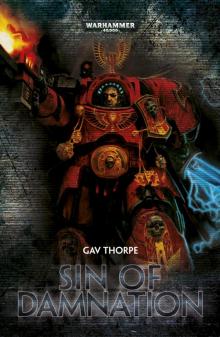 Sin of Damnation - Gav Thorpe
Sin of Damnation - Gav Thorpe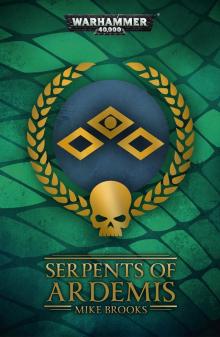 Serpents of Ardemis - Mike Brooks
Serpents of Ardemis - Mike Brooks Unbroken - Chris Wraight
Unbroken - Chris Wraight Last Flight - Edoardo Albert
Last Flight - Edoardo Albert Light of a Crystal Sun - Josh Reynolds
Light of a Crystal Sun - Josh Reynolds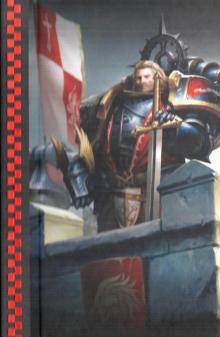 Lion El'Jonson- Lord of the First - David Guymer
Lion El'Jonson- Lord of the First - David Guymer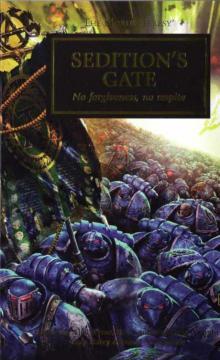 Sedition's Gate - Nick Kyme & Chris Wraight
Sedition's Gate - Nick Kyme & Chris Wraight Manflayer - Josh Reynolds
Manflayer - Josh Reynolds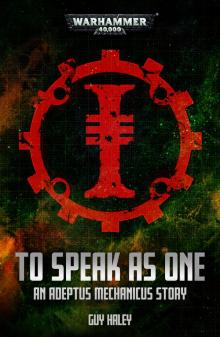 To Speak as One - Guy Haley
To Speak as One - Guy Haley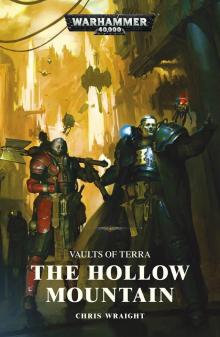 Vaults of Terra- The Hollow Mountain - Chris Wraight
Vaults of Terra- The Hollow Mountain - Chris Wraight Season of Shadows - Guy Haley
Season of Shadows - Guy Haley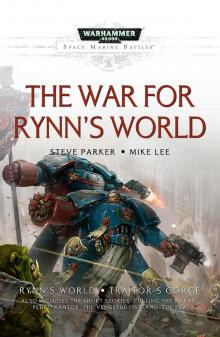 The War for Rynn's World - Steve Parker & Mike Lee
The War for Rynn's World - Steve Parker & Mike Lee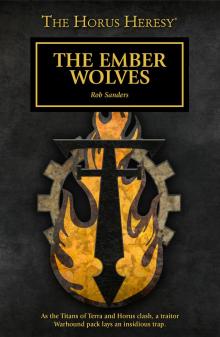 The Ember Wolves - Rob Sanders
The Ember Wolves - Rob Sanders Divination - John French
Divination - John French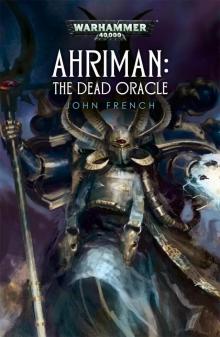 The Dead Oracle - John French
The Dead Oracle - John French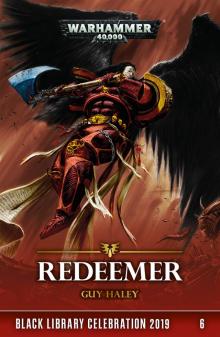 Redeemer - Guy Haley
Redeemer - Guy Haley Crusade & Other Stories - Dan Abnett Et Al.
Crusade & Other Stories - Dan Abnett Et Al.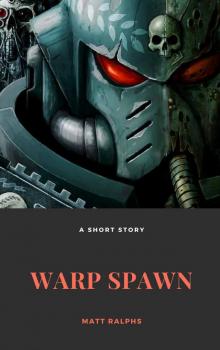 Warp Spawn - Matt Ralphs
Warp Spawn - Matt Ralphs The Absolution of Swords - John French
The Absolution of Swords - John French The Smallest Detail - Sandy Mitchell
The Smallest Detail - Sandy Mitchell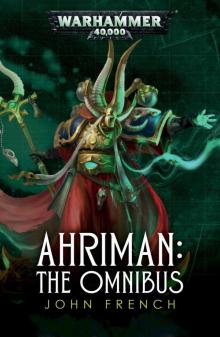 The Omnibus - John French
The Omnibus - John French Legacy of the Wulfen - David Annandale & Robbie MacNiven
Legacy of the Wulfen - David Annandale & Robbie MacNiven A Memory of Tharsis - Josh Reynolds
A Memory of Tharsis - Josh Reynolds Defenders of Mankind - David Annandale & Guy Haley
Defenders of Mankind - David Annandale & Guy Haley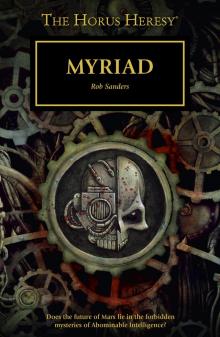 Myriad - Rob Sanders
Myriad - Rob Sanders Execution - Rachel Harrison
Execution - Rachel Harrison Hell Night - Nick Kyme
Hell Night - Nick Kyme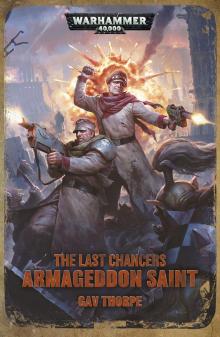 Armageddon Saint - Gav Thorpe
Armageddon Saint - Gav Thorpe On Wings of Blood
On Wings of Blood The Reaping Time - Robbie MacNiven
The Reaping Time - Robbie MacNiven Sons of the Emperor
Sons of the Emperor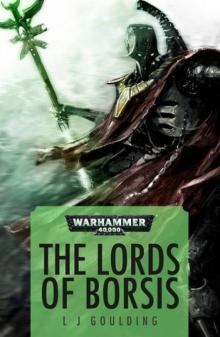 The Lords of Borsis - L J Goulding
The Lords of Borsis - L J Goulding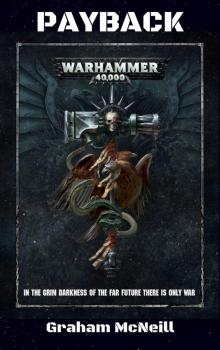 Payback - Graham McNeill
Payback - Graham McNeill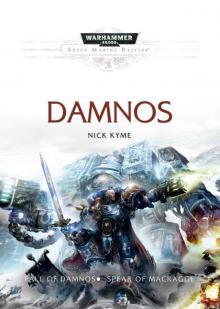 Damnos - Nick Kyme
Damnos - Nick Kyme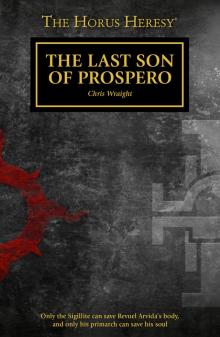 The Last Son of Prospero - Chris Wraight
The Last Son of Prospero - Chris Wraight Reborn - Nicholas Wolf
Reborn - Nicholas Wolf A Company of Shadows - Rachel Harrison
A Company of Shadows - Rachel Harrison Assassinorum- Divine Sanction - Robert Rath
Assassinorum- Divine Sanction - Robert Rath Fate Unbound - Robbie MacNiven
Fate Unbound - Robbie MacNiven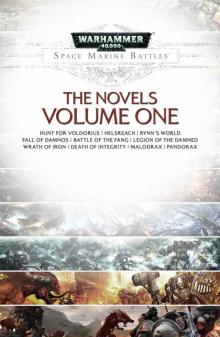 Space Marine Battles - the Novels Volume 1
Space Marine Battles - the Novels Volume 1 The Returned - James Swallow
The Returned - James Swallow Shadowbreaker - Steve Parker
Shadowbreaker - Steve Parker Lords and Tyrants
Lords and Tyrants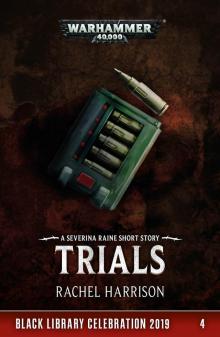 Trials - Rachel Harrison
Trials - Rachel Harrison Apocalypse - Josh Reynolds
Apocalypse - Josh Reynolds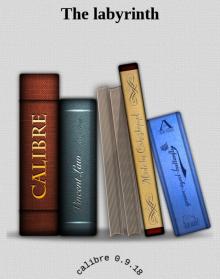 The labyrinth - Richard Ford
The labyrinth - Richard Ford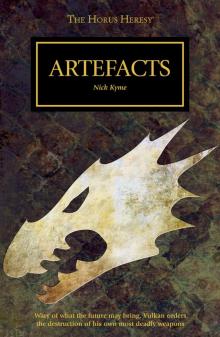 Artefacts - Nick Kyme
Artefacts - Nick Kyme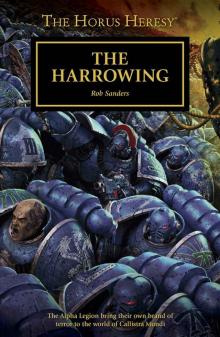 The Harrowing - Rob Sanders
The Harrowing - Rob Sanders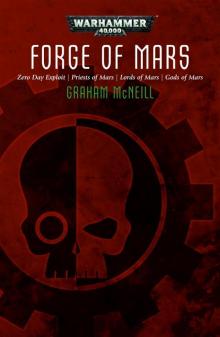 Forge of Mars - Graham McNeill
Forge of Mars - Graham McNeill Lesser Evils - Toby Frost
Lesser Evils - Toby Frost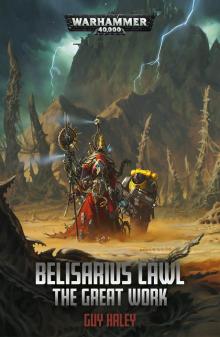 Belisarius Cawl- the Great Work - Guy Haley
Belisarius Cawl- the Great Work - Guy Haley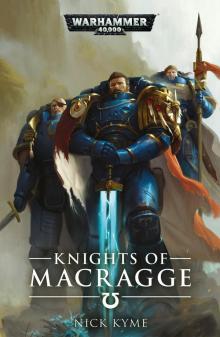 Knights of Macragge - Nick Kyme
Knights of Macragge - Nick Kyme Fulgrim- The Palatine Phoenix - Josh Reynolds
Fulgrim- The Palatine Phoenix - Josh Reynolds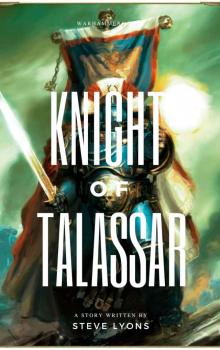 Knight of Talassar - Steve Lyons
Knight of Talassar - Steve Lyons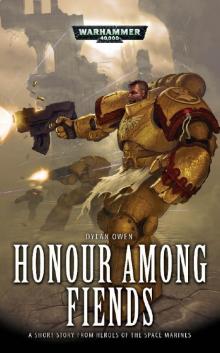 Honour Among Fiends - Dylan Owen
Honour Among Fiends - Dylan Owen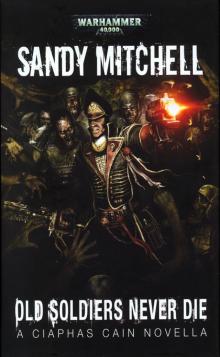 Old Soldiers Never Die - Sandy Mitchell
Old Soldiers Never Die - Sandy Mitchell Heart & Soul - James Swallow
Heart & Soul - James Swallow Wolf Trap - Robbie MacNiven
Wolf Trap - Robbie MacNiven Blackshield - Chris Wraight
Blackshield - Chris Wraight Blood Rite - Rachel Harrison
Blood Rite - Rachel Harrison The Space Wolf Omnibus - William King
The Space Wolf Omnibus - William King The Hunt for Magnus - Chris Wraight
The Hunt for Magnus - Chris Wraight The Broken Crown - Robbie MacNiven
The Broken Crown - Robbie MacNiven Wild Rider - Gav Thorpe
Wild Rider - Gav Thorpe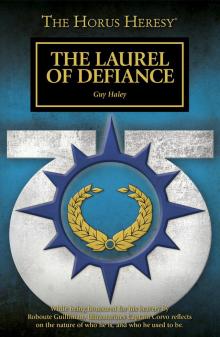 The Laurel of Defiance - Guy Haley
The Laurel of Defiance - Guy Haley War of the Fang - Chris Wraight
War of the Fang - Chris Wraight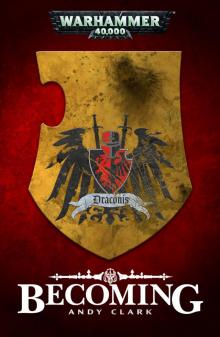 Becoming - Andy Clark
Becoming - Andy Clark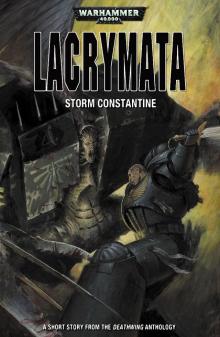 Lacrymata - Storm Constantine
Lacrymata - Storm Constantine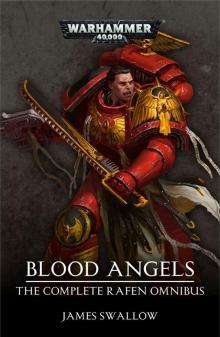 Blood Angels - The Complete Rafen Omnibus - James Swallow
Blood Angels - The Complete Rafen Omnibus - James Swallow The Darkling Hours - Rachel Harrison
The Darkling Hours - Rachel Harrison The Test of Faith - Thomas Parrott
The Test of Faith - Thomas Parrott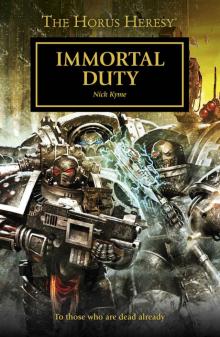 Immortal Duty - Nick Kyme
Immortal Duty - Nick Kyme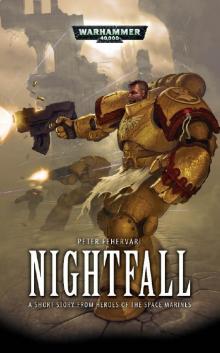 Nightfall - Peter Fehervari
Nightfall - Peter Fehervari The Relic - Jonathan Green
The Relic - Jonathan Green Konrad Curze the Night Haunter - Guy Haley
Konrad Curze the Night Haunter - Guy Haley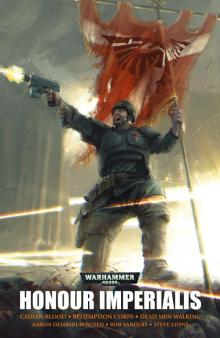 Honour Imperialis - Aaron Dembski-Bowden
Honour Imperialis - Aaron Dembski-Bowden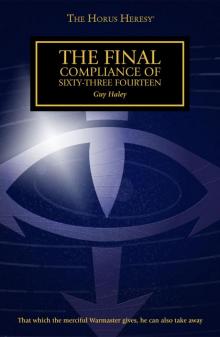 The Final Compliance of Sixty-Three Fourteen - Guy Haley
The Final Compliance of Sixty-Three Fourteen - Guy Haley Grandfather’s Gift - Guy Haley
Grandfather’s Gift - Guy Haley Twisted - Guy Haley
Twisted - Guy Haley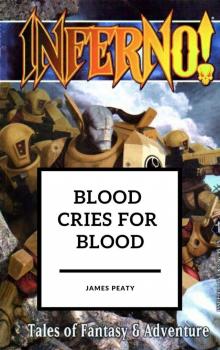 Blood Cries for Blood - James Peaty
Blood Cries for Blood - James Peaty Spear of the Emperor - Aaron Dembski-Bowden
Spear of the Emperor - Aaron Dembski-Bowden All That Remains - James Swallow
All That Remains - James Swallow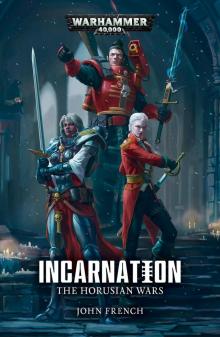 Incarnation - John French
Incarnation - John French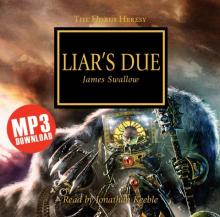 Liar's Due - Ben Swallow
Liar's Due - Ben Swallow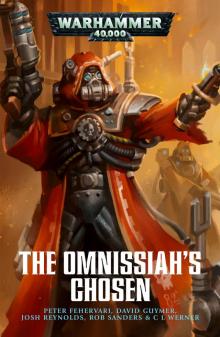 The Omnissiah's Chosen - Peter Fehervari
The Omnissiah's Chosen - Peter Fehervari Fire and Ice - Peter Fehervari
Fire and Ice - Peter Fehervari Only Blood - Guy Haley
Only Blood - Guy Haley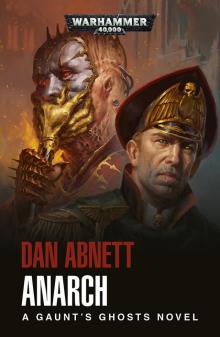 Anarch - Dan Abnett
Anarch - Dan Abnett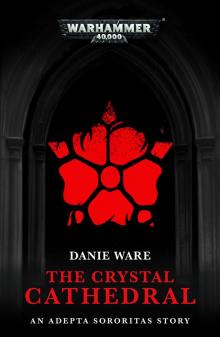 The Crystal Cathedral - Danie Ware
The Crystal Cathedral - Danie Ware Shadowbreaker
Shadowbreaker Hounds of Wrath - John French
Hounds of Wrath - John French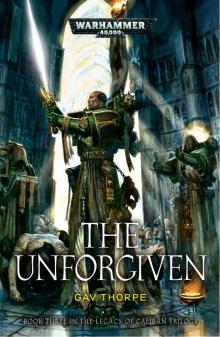 The Unforgiven - Gav Thorpe
The Unforgiven - Gav Thorpe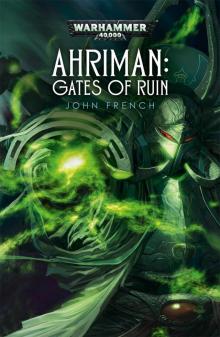 Gates of Ruin - John French
Gates of Ruin - John French Celestine - Andy Clark
Celestine - Andy Clark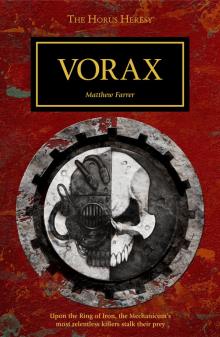 Vorax - Matthew Farrer
Vorax - Matthew Farrer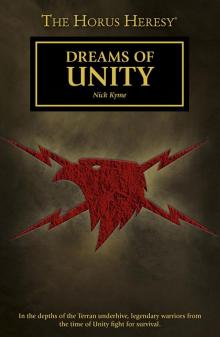 Dreams of Unity - Nick Kyme
Dreams of Unity - Nick Kyme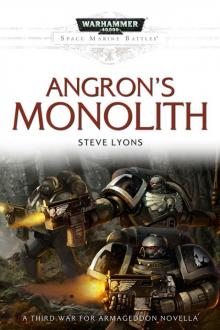 Angron's Monolith - Steve Lyons
Angron's Monolith - Steve Lyons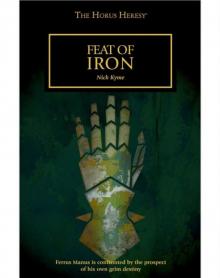 Feat of Iron - Nick Kyme
Feat of Iron - Nick Kyme Scions of the Emperor
Scions of the Emperor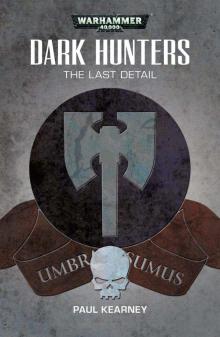 The Last Detail - Paul Kearney
The Last Detail - Paul Kearney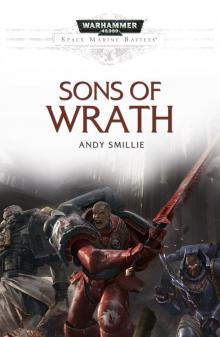 Sons of Wrath - Andy Smillie
Sons of Wrath - Andy Smillie Repentia - Alec Worley
Repentia - Alec Worley Doom Flight - Cavan Scott
Doom Flight - Cavan Scott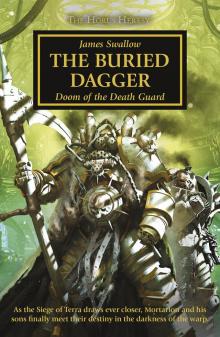 The Buried Dagger - James Swallow
The Buried Dagger - James Swallow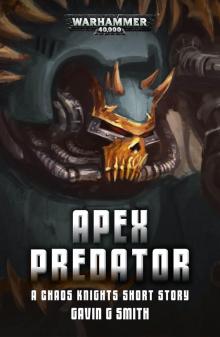 Apex Predator - Gavin G Smith
Apex Predator - Gavin G Smith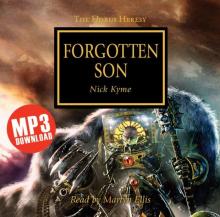 Forgotten Sons - Nick Kyme
Forgotten Sons - Nick Kyme Honourbound - Rachel Harrison
Honourbound - Rachel Harrison Lightning Run - Peter McLean
Lightning Run - Peter McLean The Passing of Angels - John French
The Passing of Angels - John French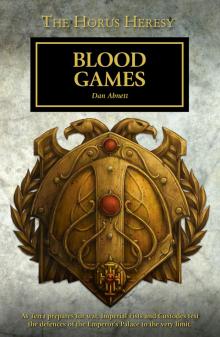 Blood Games - Dan Abnett
Blood Games - Dan Abnett Warriors of the Imperium - Andy Hoare & S P Cawkwell
Warriors of the Imperium - Andy Hoare & S P Cawkwell Warcry
Warcry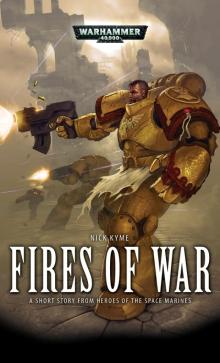 Fires of War - Nick Kyme
Fires of War - Nick Kyme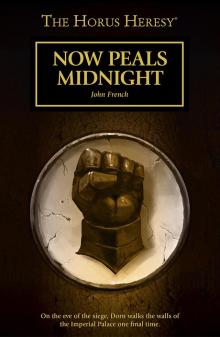 Now Peals Midnight - John French
Now Peals Midnight - John French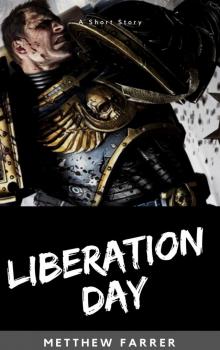 Liberation Day - Matthew Farrer
Liberation Day - Matthew Farrer Endurance - Chris Wraight
Endurance - Chris Wraight Black Library Events Anthology 2018-19
Black Library Events Anthology 2018-19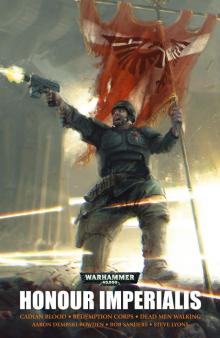 Honour Imperialis - Braden Campbell & Aaron Dembski-Bowden & Chris Dows & Steve Lyons & Rob Sanders
Honour Imperialis - Braden Campbell & Aaron Dembski-Bowden & Chris Dows & Steve Lyons & Rob Sanders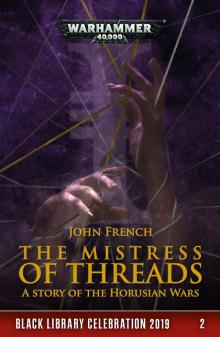 The Mistress of Threads - John French
The Mistress of Threads - John French Forge Master - David Annandale
Forge Master - David Annandale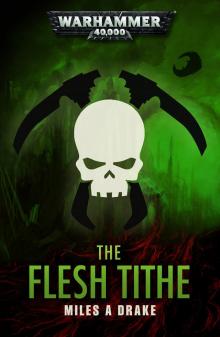 The Flesh Tithe - Miles A Drake
The Flesh Tithe - Miles A Drake Inferno Volume 2 - Guy Haley
Inferno Volume 2 - Guy Haley Mercy of the Dragon - Nick Kyme
Mercy of the Dragon - Nick Kyme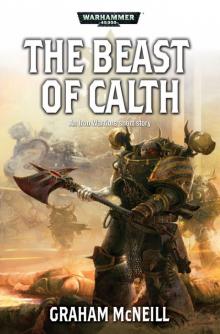 The Beast of Calth - Graham McNeill
The Beast of Calth - Graham McNeill Devourer - Joe Parrino
Devourer - Joe Parrino Exodus - Steve Lyons
Exodus - Steve Lyons Stormseer - David Annandale
Stormseer - David Annandale Shadow Captain - David Annandale
Shadow Captain - David Annandale Tallarn- Siren - John French
Tallarn- Siren - John French The Grey Raven - Gav Thorpe
The Grey Raven - Gav Thorpe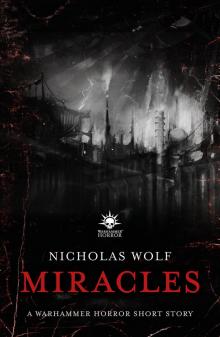 Miracles - Nicholas Wolf
Miracles - Nicholas Wolf Wings of Bone - James Swallow
Wings of Bone - James Swallow